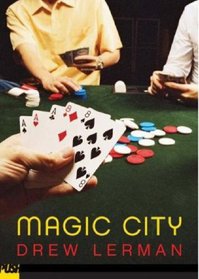Reviewed by Long Nguyen for TeensReadToo.com
PUSH Writing Intern alumnus Drew Lerman won his internship when he was a junior in high school. MAGIC CITY is a testament to Lerman's incredible writing talent at such a young age. Lerman's handle on the English language and ability to portray characters so real and tangible creates those rare moments of escapism all readers hopefully look for in a novel.
Henry is the protagonist. He's suffering. He's suffering from post-traumatic stress syndrome after he was left alone in his home when a hurricane hit the Magic City of Miami, tearing his home to mere shambles with him still in the house. Now he's loaded up on pills and is being constantly reminded by everything around him of memories of what his therapist says he should forget.
Henry's newly befriended comrade in arms, Charlie, likes to see Henry up against the wall, gun to his head, finger to the trigger, suffering. Charlie is the embodiment of Lerman's clever literary device to foil Henry, and to spark, among other things, deep-minded philosophical Q&A sessions -- whose topics run anywhere from whether or not the whole world can be grouped into three different types of people to Nietzsche-sourced references of power, control, and 'God is dead.'
Henry wants to believe that everything that's going on is okay. That it's in the past, okay, good, get over it. But he can't, and he's suffering. And his girlfriend broke up with him.
Showing bear-down command of rhetoric and prose, Drew Lerman's debut novel showcases him as a voice quite unheard of before. His portrayal of high school life and the internal struggles of human nature in teenagers lends itself to all people and is significantly compelling and very original.
Cheers to D.L.
PUSH Writing Intern alumnus Drew Lerman won his internship when he was a junior in high school. MAGIC CITY is a testament to Lerman's incredible writing talent at such a young age. Lerman's handle on the English language and ability to portray characters so real and tangible creates those rare moments of escapism all readers hopefully look for in a novel.
Henry is the protagonist. He's suffering. He's suffering from post-traumatic stress syndrome after he was left alone in his home when a hurricane hit the Magic City of Miami, tearing his home to mere shambles with him still in the house. Now he's loaded up on pills and is being constantly reminded by everything around him of memories of what his therapist says he should forget.
Henry's newly befriended comrade in arms, Charlie, likes to see Henry up against the wall, gun to his head, finger to the trigger, suffering. Charlie is the embodiment of Lerman's clever literary device to foil Henry, and to spark, among other things, deep-minded philosophical Q&A sessions -- whose topics run anywhere from whether or not the whole world can be grouped into three different types of people to Nietzsche-sourced references of power, control, and 'God is dead.'
Henry wants to believe that everything that's going on is okay. That it's in the past, okay, good, get over it. But he can't, and he's suffering. And his girlfriend broke up with him.
Showing bear-down command of rhetoric and prose, Drew Lerman's debut novel showcases him as a voice quite unheard of before. His portrayal of high school life and the internal struggles of human nature in teenagers lends itself to all people and is significantly compelling and very original.
Cheers to D.L.




